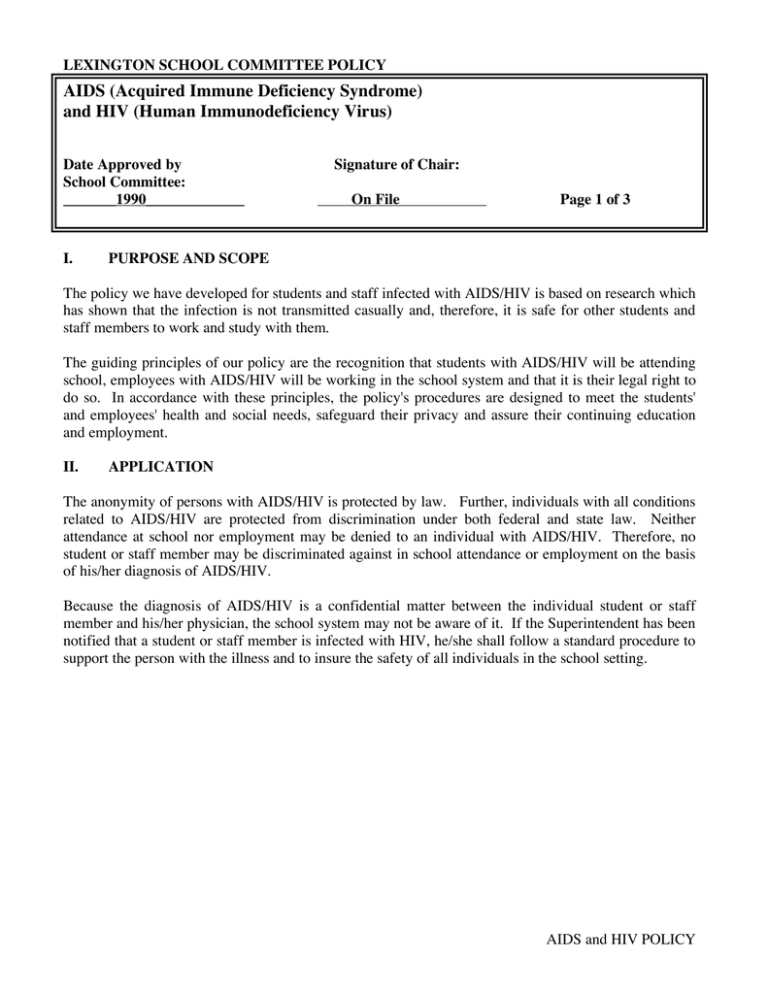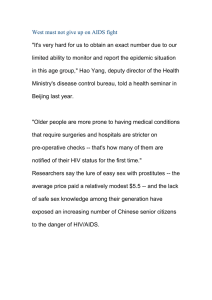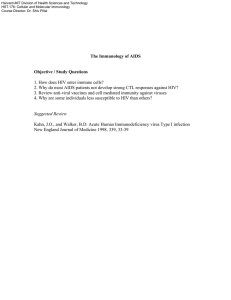AIDS (Acquired Immune Deficiency Syndrome)
advertisement

LEXINGTON SCHOOL COMMITTEE POLICY AIDS (Acquired Immune Deficiency Syndrome) and HIV (Human Immunodeficiency Virus) Date Approved by School Committee: _______1990_____________ I. Signature of Chair: On File Page 1 of 3 PURPOSE AND SCOPE The policy we have developed for students and staff infected with AIDS/HIV is based on research which has shown that the infection is not transmitted casually and, therefore, it is safe for other students and staff members to work and study with them. The guiding principles of our policy are the recognition that students with AIDS/HIV will be attending school, employees with AIDS/HIV will be working in the school system and that it is their legal right to do so. In accordance with these principles, the policy's procedures are designed to meet the students' and employees' health and social needs, safeguard their privacy and assure their continuing education and employment. II. APPLICATION The anonymity of persons with AIDS/HIV is protected by law. Further, individuals with all conditions related to AIDS/HIV are protected from discrimination under both federal and state law. Neither attendance at school nor employment may be denied to an individual with AIDS/HIV. Therefore, no student or staff member may be discriminated against in school attendance or employment on the basis of his/her diagnosis of AIDS/HIV. Because the diagnosis of AIDS/HIV is a confidential matter between the individual student or staff member and his/her physician, the school system may not be aware of it. If the Superintendent has been notified that a student or staff member is infected with HIV, he/she shall follow a standard procedure to support the person with the illness and to insure the safety of all individuals in the school setting. AIDS and HIV POLICY AIDS (Acquired Immune Deficiency Syndrome) and HIV (Human Immunodeficiency Virus) Page 2 of 3 The guidelines of the policy are as follows: I. School Attendance Policy for Students A. All students diagnosed as having AIDS or HIV infection have the right to attend regular classes. B. The student's personal physician is the medical manager of the student with AIDS or HIV infection. Medical management includes acting as the "gatekeeper" for the child's attendance at school. C. In the case of HIV, the Superintendent or designee shall determine whether the person who is infected has a secondary infection, such as tuberculosis, that constitutes a recognized risk of transmission in the school setting. This is a medical question, and the Superintendent shall answer it by consulting with the following people: the student's physician, a qualified public health official who is responsible for such determinations; the student; and the student's parent or guardian. This group shall also discuss ways that the school may help anticipate and meet the needs of the student who is HIV positive. D. If there is a secondary infection that constitutes a medically recognized risk of transmission in the school setting, the Superintendent shall consult with the physician, public health official, the student and the student's parent or guardian to develop an individually tailored plan. E. If an individually tailored plan is necessary, it shall have minimal impact on the student's education. It must be medically, legally, educationally, and ethically sound. The Superintendent will establish guidelines for periodic review of the case and will oversee implementation of the plan in accordance with local, state, and federal laws, including due process and appeal. (Relevant state and local laws should be included here.) F. If there is no secondary infection that constitutes a medically recognized risk of transmission in the school setting, the Superintendent shall not alter the education program for the student. However, the Superintendent or designee shall periodically review the case with the student, the student's parent or guardian, and the medical advisors described above. G. If there is a known instance of transmissible disease among students, the parents/guardian shall be notified by the Superintendent or designee. AIDS and HIV POLICY AIDS (Acquired Immune Deficiency Syndrome) and HIV (Human Immunodeficiency Virus) H. II. III. Siblings of students with AIDS or HIV have the right to attend school without any restrictions. Personnel Employment Policy A. Employment - Any employee diagnosed as having AIDS/HIV shall not be discriminated against in employment and shall not be terminated from employment because of such a condition. B. III. Page 3 of 3 Any employee who is unable to work because AIDS/HIV or related conditions shall be entitled to the same benefits as any employee with illness or disability in accordance with School Committee policy and the terms of the respective employee contract agreements. Prevention Education In order to support AIDS prevention education in the Lexington Public Schools, the School Committee affirms its commitment to a K-12 comprehensive health education life skills program. A. AIDS/HIV prevention education will be emphasized at developmentally appropriate levels throughout the Life Skills curriculum. B. In addition, the School Committee will support ongoing efforts to train all staff in AIDS/HIV awareness. BACKGROUND HIV, the virus that causes AIDS, is not transmitted by casual, everyday contact. Epidemiologic studies show that HIV is transmitted via sexual intercourse, sharing of needles among intravenous drug users, or blood to blood contact. To date, there is no evidence that the AIDS virus can be transmitted by sitting near, living in the same household with, or playing with an individual with AIDS. There is no evidence that AIDS/HIV can be acquired through air, food, water or close non-sexual contact such as coughing, sneezing, hugging, sharing of eating utensils or toys, or shaking hands. AIDS and HIV POLICY PROCEDURE PAGE AIDS (Acquired Immune Syndrome) and HIV (Human Immunodeficiency Virus) APPENDIX A UNIVERSAL PRECAUTION GUIDELINES All blood should be handled in accordance with the following universal precaution guidelines: a. b. c. d. e. f. Treat blood with respect. All blood spills should be cleaned up promptly by trained personnel. Inspect the intactness of your skin on all exposed body parts, especially the hands. Cover any and all open cuts or broken skin, or ask another staff member to do the clean up. Latex gloves contribute an added measure of protection, but are not essential if your skin is intact. Blood spills should be cleaned up with a solution of one part household bleach to ten parts water. Always wash your hands after any contact with body fluids. This should be done immediately in order to avoid contaminating other surfaces or parts of your body (be especially careful not to touch your eyes before washing up.) Soap and water will kill HIV. Other body fluid spills (urine, vomitus, feces), unless grossly blood contaminated, need only be cleaned up in the usual manner. They do not pose a significant risk of HIV infection. APPENDIX B RECOMMENDATIONS FOR FOOD HANDLERS 1. A food handler diagnosed as having AIDS, or HIV infection is not cause for excluding food handlers from work or for restricting that worker's activities on the job. Since being infected with the virus alone poses no risk to employee safety or product quality, no changes or precautions need be initiated in the work place. 2. The health standards for personnel are applicable to all food handlers and are clearly outlined in Chapter X of the Massachusetts State Sanitary Code as follows: 590.008 Employee Health To employee, while infected with a disease in a communicable form that can be transmitted by foods, or who is a carrier of organisms that cause such a disease or while affected with a boil, infected wound, or acute respiratory infection, shall work in a food establishment in any capacity in which there is a likelihood of such person contaminating food or food-contact surfaces with pathogenic organisms or transmitting disease to other persons. A food handler diagnosed as having AIDS or HIV infection should not be permitted to work when he/she develops a secondary infectious disease that can be communicated to others -- hepatitis, for example. AIDS and HIV POLICY 3. When an injury occurs during food preparation, food contaminated with blood or body fluids should be immediately discarded. Contaminated work surfaces should be sanitized with a 10% bleach solution. AIDS and HIV POLICY


